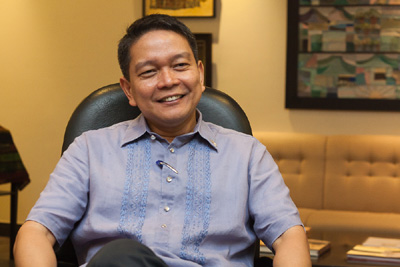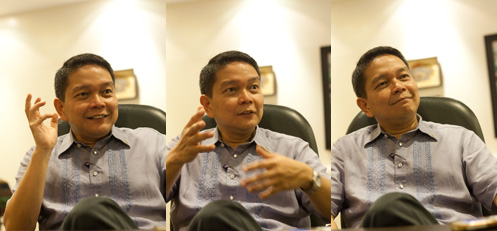Soon after he took the helm of one of the country’s most influential universities, Fr. Jose Ramon “Jett" Villarin, SJ let everyone know that he would be different from his non-confrontational predecessor. The new president of Ateneo de Manila University issued a memo in early August calling on the Ateneo community to protest the zone exemptions given by the city government to a high-rise building being constructed by the SM Development Corporation along Katipunan Avenue, where the Ateneo campus is located. Villarin's academic community responded by marching outside its gated leafy campus, carrying placards and leading the various neighborhoods in Loyola Heights in the protest. They came “down from the hill," as the Ateneo fight song exhorts. It was a call that some administrators could not imagine his predecessor, the mathematician Fr. Bienvenido “Ben" Nebres, SJ, making. It marked the start of an era with what some observers see as a more activist leadership for the university. Villarin, a 51-year-old physicist who was valedictorian of his college batch, will be formally taking the reins of the university in his investiture ceremony Thursday, but has been effectively running the university since June 1. Contrast in leadership styles While the amiable Nebres presided over a robust expansion of the university over the last 18 years, not to mention three consecutive UAAP championships for its seniors basketball team, he was criticized by some faculty members for his apolitical stance, urging civic-minded students to build homes for Gawad Kalinga rather than protest political leaders.

Fr. Jett Villarin, SJ, the new president of Ateneo de Manila University, said the university will make an effort to be a "change catalyst" under his leadership. Photo by James Magalong
Nebres didn’t like “forms of activism that directly challenge the state," said lecturer Lisandro Claudio in an interview with Ateneo’s school newspaper, The Guidon, in 2010. Nebres instead emphasized working
with the government, Claudio said. So while Ateneo's archrival De La Salle University actively opposed the administration of former President Gloria Arroyo, even at one time harboring whistleblower Jun Lozada, Nebres kept his community mostly above the political fray. The tone of Villarin's memo to the university demonstrates an early willingness to confront the abuse of power. “The issue at hand is not merely the rise of a building of more than forty floors in Ateneo’s backyard, but the failure to conduct the proper, legal process in the construction of this condominium…
Utak wang wang or
tuwid na daan?" read the August 8 memo. In an interview with GMA News Online several days before his investiture, Ateneo’s newly-appointed president talked about nation-building and how his scientific training will affect his approach to problem solving.
Climate change expert After graduating class valedictorian with a Physics degree from Ateneo de Manila in 1980, Villarin went on to obtain a Master’s degree from Marquette University in Wisconsin, USA. His doctorate in Atmospheric Sciences comes from Georgia Institute of Technology in the United State. In a field full of abstract, egg-head specializations, he chose perhaps the most socially relevant: climate change. It's also the most talked about global scientific issue of our time. His background in science figures prominently in his plans for the university, as well as his approaches to attacking larger societal problems. “There are many ways to solve social problems but I don't know if anyone is thinking about these things," he said. The practice of “strategic thinking," as Villarin puts it, involves understanding the different facets of an issue. “Poverty is a monster with many hearts--you can't eliminate it just by killing one heart, even in succession." “If you're not thinking through a problem, it will come back. You have to be decisive, incisive and to do that, you need research," he said.
'Change catalysts' Aside from strategic thinking, Villarin said that the university will also be making an effort at being “change catalysts" and “culture shapers." “A catalyst isn't really involved in the motions—a catalyst, by its presence, makes things happen. I think we better serve society by facilitating the coming together of social actors," he said. The role, he added, could be best expressed in the university’s involvement in educational development and in particular, the Department of Education’s
K+12 basic education program. “Fr. Nebres has already spoken about this before. I’m more interested in making it work. If you speak to the other presidents of the Ateneo, we are all interested in making this work," he said. Last year, Nebres expressed in a public forum his doubts about the program’s ability to improve the quality of education.

Villarin's background in science figures prominently in his plans for the university, as well as his approaches to attacking larger societal problems. Photo by James Magalong
Nation building, Villarin said, also involves strengthening and deepening love of country. “If you're going to build the nation, you cannot build what you do not love. You cannot love what is not your own," he said. The university’s formation programs, said Villarin, are also being reviewed. The programs are governed by the university’s values, most notably of being “men and women for others." The review is part of Villarin’s vision to strengthen the Atenean “mission and identity," one of the three major tasks he sees to accomplish in the next six years (“I hope to stay [for a maximum] of six years," he said, laughing). If education was one of Nebres’ advocacies during his term, Villarin sees environment and development as something the university needs to focus its attention on as well. “It's not just environment but environment and development. Sometimes, these two are played against each other and I think it's possible to bring them together. We have to—we've seen the cost of our development, the price we've had to pay," he said. A committee he has formed to spearhead the environment and development thrust already began preliminary research on the issue. “[We also need to] draft the 'blue prints for a green economy' [and] understand why it's so difficult to put renewable or alternative products in the market," said Villarin.
From personal to structural The climate change expert added that it’s about time people move beyond the personal level when it comes to the environment; meaning, it’s time to go beyond individual vows to start recycling, conserving, or being green-minded. “It’s not enough because the problem is structural, it’s systematic," he said. Ultimately, Villarin said that the university’s priorities—nation building, environment and development, and a call for individuals to be change catalysts, strategic thinkers and culture shapers—aren’t just for those who studied in Loyola Heights (or Padre Faura, for that matter). “This isn't just about Ateneans, but [every] Filipino," he said. Villarin’s appointment was announced in mid 2010 and he assumed office on June 1, 2011. Villarin’s formal investiture as president will be held at the Henry Lee Irwin Theatre inside the Ateneo de Manila Loyola Heights campus. Among the attendees will be President Benigno “Noynoy" Aquino, III, a fellow Ateneo alumnus of the same age as Villarin.
- Edited by Howie Severino, with reports from Paterno Esmaquel II, GMA News Online, and Kevin Mizon, The GUIDON 






